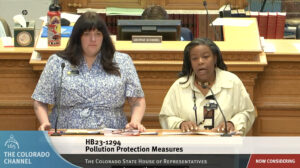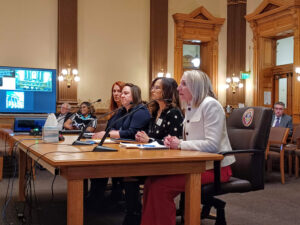Despite the business sector killing or paring down many of the proposals it most opposed during the 2023 legislative session, several groups still are asking Gov. Jared Polis for vetoes on a handful of bills that they consider hurtful to specific industries or the overarching economy.
Those requests involve several bills legislators toned down significantly, including efforts regarding air-quality permitting and a redefinition of harassment, as well as measures like an update to the state’s pay-equity law that saw little change over 120 days. But they are not universal requests, as groups like Colorado Chamber of Commerce, Colorado Concern, Colorado Restaurant Association and Colorado Hospital Association say they won’t ask the Democratic governor to use his veto pen on any passed legislation this year.
Polis is nine days into the 30-day period in which he can sign bills, veto them or allow bills to become law without his signature. He’s already inked a slew of bills, ranging from measures on utility cost recovery to workforce-development funding, and on Tuesday issued his first three vetoes of the year on bills that would have delayed reintroduction of wolves, created a new fee on drivers’ licenses for funding driver education and created a new process to seek clemency.
But some of the most controversial business bills of the session remain in limbo, and a handful of business organizations are hoping to sway Polis on the chance he’s still debating their fate.
Targets of veto requests
The only one on the lists of multiple organizations that responded to questions from The Sum & Substance appears to be House Bill 1294, which already underwent three rounds of major changes to get through the House and Senate. Originally written to add restrictions on air-quality permits for producers of what are considered minor sources of pollution, the bill now proposes creation of an interim legislative committee to examine reform and a deadline for an ongoing process to define “cumulative impacts.”

Colorado state Reps. Jenny Willford and Jennifer Bacon speak on April 29 about their bill to improve Colorado’s air-quality permitting process.
Still, the Denver Metro Chamber of Commerce has listed it as one of two bills it’s asking Polis to veto, saying that it contains several concerning provisions, and that history has shown that interim committees lead to radical future legislation. American Petroleum Institute Colorado Director Kait Schwartz issued a statement that HB 1294 remains duplicative to ongoing regulatory work and will take time and resources from several state agencies by requiring fuller investigation of complaints that may be without merit.
“Make no mistake: The special interests behind this measure remain focused on their longer-term goal of driving energy development out of Colorado by any means necessary, and it is incredibly disappointing that lawmakers are willing participants in such a malevolent undertaking,” Schwartz said.
Right of first refusal
The Denver Chamber’s other request for a veto focuses on HB 1190, which would make Colorado the first state to create a right of first refusal for local governments to step in and match offers on certain apartment complexes that go up for sale.
Sponsoring Sen. Faith Winter, D-Westminster, made several concessions on the bill, exempting complexes that are less than 30 years old, boosting to 15 the minimum number of units for urban complexes to be eligible for an offer and shortening timelines for local-government offers. However, Adam Burg, vice president of government affairs for the Denver Chamber, said the remaining provisions of the bill still would repel capital investment and make it more difficult to build badly needed housing stock.
“House Bill 1190 is a direct government affront on the housing market,” Burg wrote. “The legislation would discourage investment in affordable housing, create administrative and financial burdens for landlords, limit market value and limit the flexibility of landlords to sell their properties.”
NFIB seeks three vetoes
The National Federation of Independent Business, meanwhile, announced Tuesday that it asked Polis in a letter for vetoes of three bills on workplace regulations that drew varying amounts of criticism from the wider business community during the session.

A panel featuring (L to R) Special District Association of Colorado General Counsel Diane Criswell, Sherman & Howard Attorney Brooke Colaizzi, Special District Association Executive Director Ann Terry and Colorado Chamber of Commerce President/CEO Loren Furman testifies against the POWR Act before the Senate Judiciary Committee.
The bill that began with the most contention of the three was Senate Bill 172, which proposed to redefine harassment in a broader way, limit nondisclosure agreements that employers could negotiate with accusers and create more protections for physically handicapped employees. While a coalition of business and higher-education groups was pleased with significant changes it made to the Protecting Opportunities and Workers’ Rights (POWR) Act, particularly around requirements for employers to assert an affirmative defense, NFIB said the bill still goes too far.
NFIB also asked Polis to strike SB 58, which bars employers, beginning next year, from asking for age-identifying information on initial applications, though amendments allow companies to request proof of educational attainment if the dates of attendance can be redacted.
“One-size-fits-all, extreme workplace policies”
And the organizations requested a veto of SB 105, which doubles from three to six years the amount of back pay employees can get if they prove they have been discriminated against in their compensation because of their sex. Many business groups were frustrated the bill did not exempt out-of-state employers from having to list salary ranges for remote jobs — a situation that’s led to companies declaring that Coloradans are not eligible to apply because of the rules — but no one else has sought a veto.
“Too often the media, government regulators and politicians are happy to trash employers and exaggerate the woes of workers,” NFIB state director Tony Gagliardi said in a news release. “This unbalanced focus has emboldened progressive lawmakers and worker advocates to push for more extreme workplace policies to the detriment of small businesses … Unfortunately, the negative impact of these one-size-fits-all, extreme workplace policies increases the chances of an employer being charged with a workplace complaint, and unfortunately small businesses are the most targeted.”
Colorado Chamber of Commerce President/CEO Loren Furman acknowledged that she is not a huge fan of several of the bills on which other business groups are seeking vetoes. But after negotiating with backers on many of them, particularly HB 1294 and the POWR Act, she said she believes the work has placed the final product beyond veto-request concern levels for her.
Why some groups not seeking vetoes
“We sought to find improvements to several of these bills and worked hard with the sponsors, proponents and the governor’s team,” Furman said. “We aren’t in a position where we want to ask for a veto based on those efforts. However, we still respect our fellow business groups who have concerns.”
The most industry-specific veto request is coming from the Colorado Association of Health Plans on SB 195, which requires insurers to apply drug manufacturers’ coupons on high-cost pharmaceuticals to customers’ deductibles rather than their cost-sharing calculations. Because such policy will steer consumers to higher-cost, brand-name drugs, CAHP estimated it will increase costs — and premiums — by $96 million.
“SB 23-195 runs completely counter to your aim of saving Coloradans money on healthcare, and as such, we strongly urge you to veto this legislation,” wrote CAHP executive director Saskia Young in accordance with an executive from the group America’s Health Insurance Plans.
